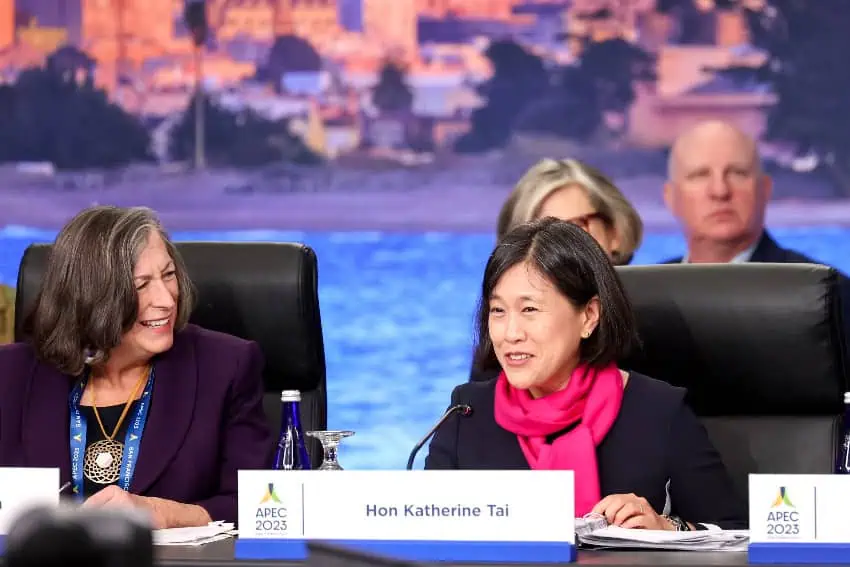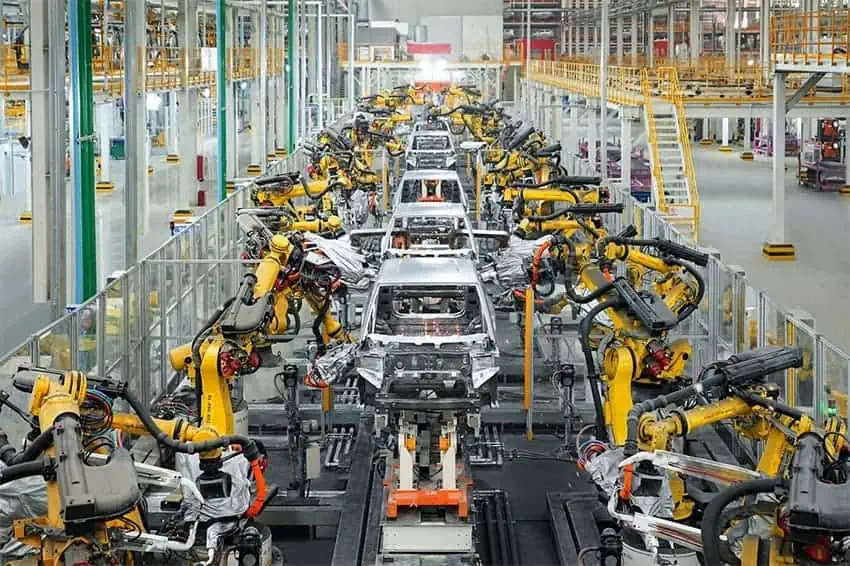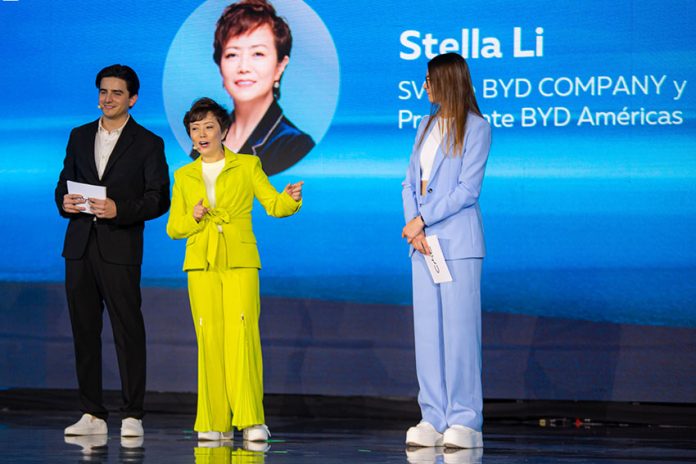The Office of the United States Trade Representative (USTR) has acknowledged a range of concerns about Chinese automotive investment in Mexico in a new report to the U.S. Congress.
Published on Monday, the “Report to Congress on the Operation of the United States-Mexico-Canada Agreement with Respect to Trade in Automotive Goods” said that the USMCA “has had a positive economic impact on the U.S. and North American auto industry” since the free-trade pact took effect on July 1, 2020.
However, the USTR noted that there have been “some challenges in implementation” of the agreement that superseded NAFTA, and warned that new challenges are “emerging.”
Among the new challenges is the increasing Chinese automotive sector investment in Mexico.
More than 30 Chinese auto-parts manufacturers already operate in the country, while several Chinese automakers, including leading electric vehicle (EV) manufacturer BYD, have plans to open plants here.
In its report, the USTR pointed out that stakeholders have “expressed concerns that increasing Chinese foreign direct investment in the automotive sector in Mexico poses a significant threat to the competitiveness of the North American auto industry.”

In a subsection titled “Chinese investment in Mexico,” the trade agency said that “several commenters,” including the United Auto Workers (UAW) and the Labor Advisory Committee on Trade Negotiations and Trade Policy (LAC), have “expressed concerns with the amount of Chinese foreign direct investment in the automotive sector in Mexico, alleging that such investment is intended to evade Section 232 and Section 301 tariffs on direct imports from China.”
The USTR also noted that the UAW has “pointed to recent U.S. import statistics showing that a greater share of autos imported from Mexico are not claiming the USMCA preference as evidence of companies taking advantage of cheaper Mexican labor but not increasing content to meet the full USMCA rules of origin.”
The USTR said that both the UAW and the LAC have “urged the United States to work closely with Canada and Mexico to examine carefully these Chinese investments and to determine whether automotive content entering the North American supply chain is connected to government-supported Chinese enterprises.”
Mexico and the United States reached an agreement late last year to cooperate on foreign investment screening as a measure to better protect the national security of both countries. The plan appeared to be motivated to a large degree by a desire to stop problematic Chinese investment in Mexico.
In its report, the USTR also acknowledged “similar concerns” about Chinese automotive sector investment in Mexico expressed by Adam Hersh, senior economist at the Economic Policy Institute, a Washington, D.C.-based think tank.
The agency noted that Hersh has argued that “the concept of ‘rollup’ in calculating the regional value content allows the share of non-North American content to increase ‘exponentially’ as components are transformed up the value chain.”
“Hersh also argued that this means significant non-North American content is benefiting from the Inflation Reduction Act’s tax credits,” the USTR added.
In addition, the USTR acknowledged that labor stakeholders have expressed concern that the increase in EV tariffs in the United States from 25% to 100% “could accelerate EV investments outside of China (including investments in Mexico) in order to avoid the duty.”
What do stakeholders want?
The USTR noted that the UAW has recommended that the Biden administration and U.S. Congress consider increasing the U.S. most favored nation (MFN) tariff on autos and auto parts, “with particular attention on EVs and related components to address potential Chinese EV imports.”
It acknowledged that in a USTR hearing in early February, the union “argued that the 2.5% U.S. MFN tariff on passenger vehicles is only a ‘minor infraction’ for not following the USMCA rules.”

The USTR also noted that the UAW “claimed that Chinese auto producers would exploit the North American automotive infrastructure and ecosystem that have been developed over the past 25 years by establishing operations in Mexico, paying the 2.5% MFN tariff and having access to the U.S. market free of the Section 232 and Section 301 tariffs.”
During the same hearing, “industry representatives commented that it is important for policymakers to be tracking the rapid growth of China’s automotive industry and for the United States, Canada and Mexico to work together to help ensure the North American automotive industry retains its integrity and high standards,” the trade agency said.
The USTR also acknowledged that stakeholders have said that “action may be needed to address Chinese automaker production from other countries” given their desire to avoid the 100% U.S. tariff on EVs.
What has the US government done?
On May 14, the United States government announced plans to increase tariffs on a range of Chinese products across several “strategic sectors,” including EVs, steel and aluminum, semiconductors, lithium-ion EV batteries and solar cells.
U.S. Trade Representative Katherine Tai attended a White House press briefing shortly after President Joe Biden directed her to increase tariffs on US $18 billion of imports from China and was promptly asked why the U.S. government wasn’t also “preemptively” announcing tariffs on EVs made in Mexico by Chinese companies, given that automakers such as BYD have announced plans to open plants south of the U.S. border.
After expressing concern about BYD’s presence in Mexico — “at USTR, that is exactly what we are built to worry about” — Tai said that measures aimed at made-in-Mexico Chinese EVs, or other products made here by Chinese companies, “will require a separate pathway.”
“This is about imports from China. What you’re talking about would be imports from Mexico. Equally important — something that we were talking to our industry, our workers and our partners about. And I would just ask you to stay tuned,” she said.
On May 22, eight days after those remarks, Tai, Mexican Economy Minister Raquel Buenrostro and Canadian International Trade Minister Mary Ng agreed to “jointly expand their collaboration on issues related to nonmarket policies and practices of other countries, which undermine the … [USMCA] and harm U.S., Canadian and Mexican workers, including in the automotive and other sectors,” according to the USTR report.
On Monday, Tai said it is “crucial that we ensure that … [the auto] sector continues to thrive in North America, across all three countries, with good-paying jobs, empowered workers and fair, market-oriented competition, especially as it transitions to new electric vehicle technologies.”
The submission of the USTR report to Congress comes two years before Mexico, the United States and Canada will conduct a scheduled review of the USMCA.

Tai said that “with just two years until the mandated six-year review of the USMCA,” the report “provides an important opportunity to utilize its findings, make adjustments and fulfill the promise of the USMCA for our three countries.”
Mexico’s President-elect Claudia Sheinbaum said last week that she believed the USMCA review would be “minor.” However, Mexico’s trade and investment relationship with China could be an issue if the United States or Canada is not happy with the way their USMCA partner is conducting that relationship.
S&P Global said in a report earlier this year that “Chinese investment and exports to Mexico are highly likely to become a headline issue ahead of the 2026 scheduled review of the USMCA.”
Mexico News Daily
